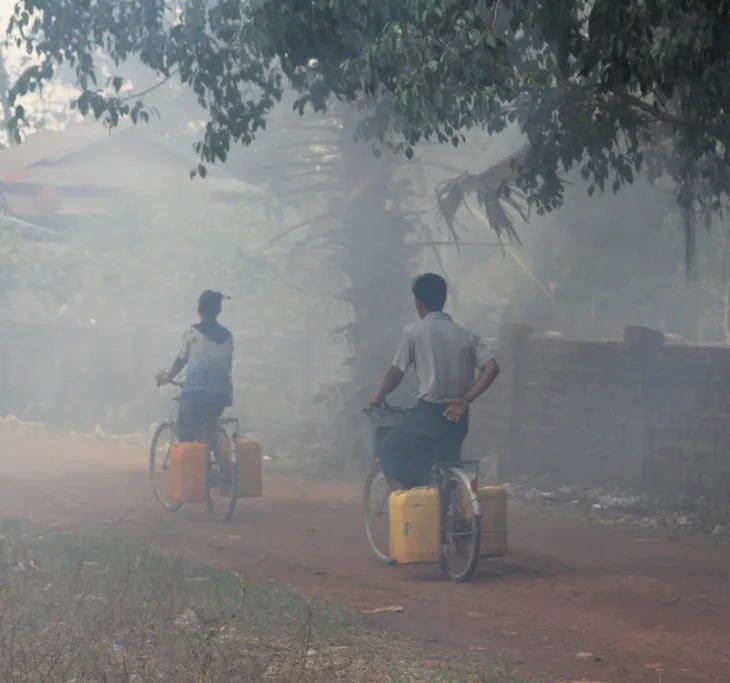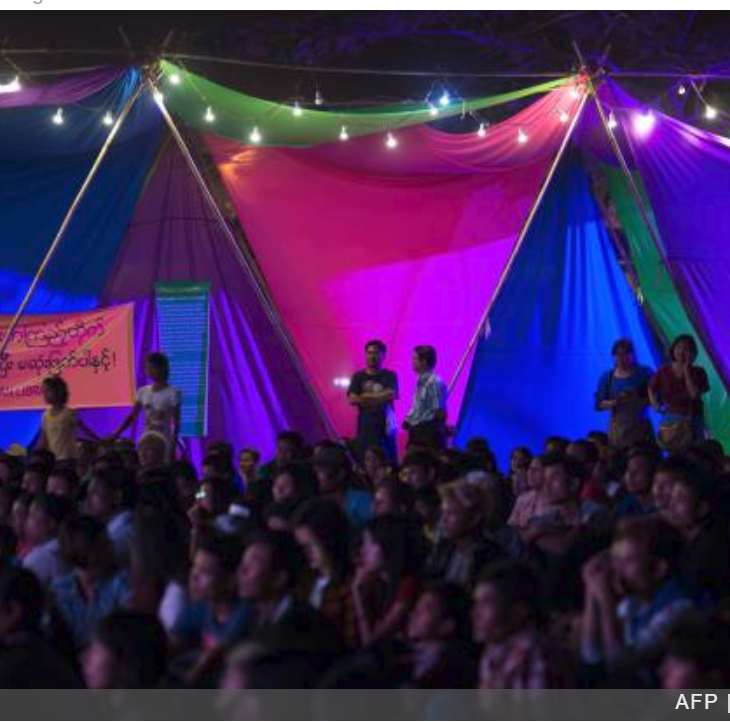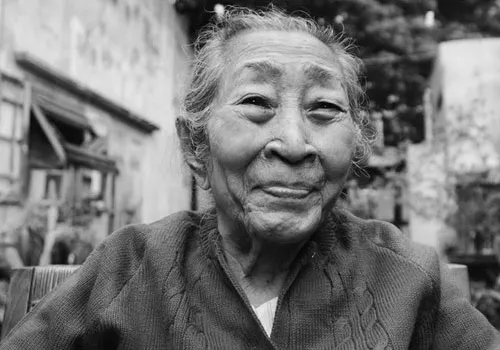Aye Thiri Kyaw and Minn Tent Bo argue for breaking the cycle of intimate partner violence in Myanmar.
Research shows that children who experienced or witnessed violence growing up are likely to normalise this form of violence. Witnessing interparental violence, i.e. either father-to- mother violence or mother-to-father violence, is a strong predictor for a later experience of intimate partner violence (IPV). Importantly, occurrences of father-to-mother abuse can be higher in a male-dominated culture.
Myanmar is a patriarchal country where gender inequality is pervasive across the country. In this article, we want to highlight that intergenerational transmission of violence exists in Myanmar. The Intergenerational Transmission of Violence is a term which refers to the association between witnessing interparental aggression during childhood and adult children perpetrating or being victims of intimate partner violence.
While there have been increasing efforts to understand IPV in recent years, debates and discussions about the Intergenerational Transmission of Violence are yet to gain traction in Myanmar. That said, the intergenerational effect of witnessing father-to-mother violence has already been observed in government-led demographic surveys. However, pathways of transmission are not fully understood due to the scarcity of data on this topic in Myanmar.
Based on our past research experiences and key informant interviews conducted during the first author’s MSC dissertation, we believe that the intergenerational violence problem may lie in Myanmar’s traditional family structure. Therefore, we argue that current government strategy on family integration must be reviewed in terms of resolving violence. To elaborate, a government report in 2015 underscores the role of the family as the foundation of social cohesion. It says that efforts will be made to reduce family separation and vulnerability. This may imply that even in cases of spousal violence, preventing the separation of family members may be the topmost priority. We argue that gender norms supporting men’s superiority in the family contribute to the perpetration of IPV and must be interrupted to end the cycle of violence.

A meta-analysis of about 124 studies on IPV revealed that there was a strong association between witnessing IPV during childhood and later becoming IPV perpetrators (in the case of men) or becoming IPV victims (in the case of women). However, the literature also shows that pathways and mechanisms through which parental abuse directly or indirectly influences adult children’s later experience with IPV remains unclear.
That said, findings from global literature also show that not all children who witnessed interparental violence become perpetrators or victims of IPV. Although interparental violence may not necessarily be a precondition for later encounters with IPV in adulthood, it is also true that witnessing violence at home is one of several risk factors that lead individuals to experience IPV themselves. Therefore, we are very interested in exploring the link between children witnessing interparental abuse and subsequently perpetrating or becoming victims of violence in their intimate partner relationships in Myanmar.
In the following section, we look at the gender norms fuelling family violence at home. We argue that changing social norms about family structure is crucial for ending violence against women in Myanmar. Our analysis is partly informed by data from key informant interviews conducted for the study of the first author’s MSC dissertation “From mothers to daughters: Intergenerational Transmission of father to mother violence in Myanmar” submitted to the London School of Economics and Political Science.
Male authority is derived from the notion of men being “အိမ်ဦးနတ်” (Eain U Nat), meaning household gods of the family. It is directly or indirectly reinforced at home or at school through parents, parents in law and social norms.
For instance, the Grade 3 curriculum for primary students teaches children that fathers are admirable because they feed the family or act as sole breadwinners in the house. Although women are increasingly earning money in a changing context, official documents such as family registration cards only put men as breadwinners and women as dependents regardless of their occupation. The portrayal of a father as an admirable figure is thus justified even if he abuses his power. This unparalleled status is also reinforced by proverbs such as “သားကိုသခင်လင်ကိုဘုရား”, (Thar Ko Tha Khin, Lin Ko Phayar, “Son is the master and husband is the god”). An interview informant we spoke with emphasised how she was socialised to defer to her husband in day-to-day practice:
“We were even taught to ကန်တော့[1] at night to our husbands. We were taught by my mother who was taught by her mother. This is our cultural responsibility.”
That escalates further when the status quo generally expects men to be the leaders of their households. Until 2019, women and youths were not allowed to vote during municipal elections, as the polls were based on a system of household suffrage where only the head of the household – usually the father – had the right to vote. The first municipal election based on universal suffrage was only held in March 2019 (McRae, 2019). This shows how deeply this cultural norm is rooted in Myanmar society. Many people in society still welcome the birth of a son more than a daughter, reflecting a broader preference for the male sex in many parts of south, east and central Asia (OHCHR, UNFPA, UNICEF, UN WOMEN, WHO, 2011).
The authority given to men by their families also comes with the entitlement to be treated differently from the rest of their family members. It is expected that mothers as housewives, with the elder daughter, are responsible for fulfilling the needs of the father. One woman we spoke to shared her memory of growing up at home:
“By breakfast time, he [my father] expected my mom to prepare food by 9.30am, and dinner by 4pm. In addition, the food had to be warm. My sister was the victim. She is the elder so [she] had to cook for her [my mother]. Others could eat whenever, but he felt entitled to this. He may or may not eat, but it must be ready. He would make a fuss otherwise.”

8 Minutes To Read
May 31, 2018

6 Minutes to Read
August 11, 2021
Another notable expression in Myanmar culture and society is the word, “ကာမပိုင်လင်”, (Karma Paing Lin) which can be identified as male entitlement to sex in a marriage even if it is against the wife’s/woman’s will. The ideology of seeing women as possessions in marriage is deeply entrenched across Myanmar society. Wife beating is often seen as a justified disciplinary action. Members of some families (including women) believe that a woman who has failed to perform her duties as a housewife deserves to be punished. This norm is reflected in the prolific rates of domestic violence in the country, which often becomes intergenerational.
Although we have little data on the link between male perpetration of violence and wife-beating attitudes, we know from existing data that 35 percent of women who experienced violence have a history of witnessing father to mother violence in Myanmar. Although pathways of violence transmission are inconclusive, existing global studies point out the likelihood of a male child seeing, then normalising, then practicing intimate partner violence as an adult. These studies also point out a correlation between a female child seeing violence, normalising it, then experiencing it as an adult victim.
We acknowledge that toxic gender norms related to masculinity also play a key role in shaping men’s lives in Myanmar. For instance, one might expect it to be normal in a relationship for both women and men to work and share household duties. There may be times when the husband is in between jobs and has to rely on the wife’s income. However, that doesn’t come across as normal nor is it positively received in Myanmar society.
The term, “ထမီနားခိုစားတယ်”, (Htamain Nar Kho Sar Teh), which means “a man taking a free ride on a wife’s income”, is an emasculating phrase people normally hear about women breadwinners. That term effectively shames a man as a scrounger at the expense of the woman, suggesting it is not a manly thing to do, as men should be the primary breadwinner of the household. Instead of portraying an egalitarian financial domestic dynamic as normal, Myanmar culture aggravates relationships between the genders by peddling notions of toxic masculinity. Besides, we also know from data from the Asia and Pacific region that husband unemployment is also a strong predictor of male perpetration of violence. One reason might be that male use of violence is a display of their resistance to the diminished status of traditional breadwinner roles.
Family is the first and most important institution that teaches children about the appropriateness of their behaviour. Children who witness parents using aggression towards each other repeatedly learn such habits. Children under these circumstances learn that violence resulting from conflict is normal and inevitable. Children who experienced violence or witnessed interparental abuse during their childhood learn violent behaviour as a means to solve conflicts and repeat similar patterns in their later relationships.
Activists we spoke to agree that sons are very likely to become perpetrators of IPV if they witnessed father-to-mother violence in their childhood. They noted that men learned their father’s abuse towards their mother and modelled the perpetration in their later relationships. Although there is no current data, they are very certain about violence transmission in Myanmar. One prominent activist shared the below quote to show how violence is normalised through generations:
“Grandpa loves Grandma. Father loves Mother. I love you. Then ‘beat’ replaces ‘love(s)’. Grandpa beat Grandma. Father beat Mother. I beat you”.
Although social norms are changing in big cities, the majority of Myanmar people still believe that IPV is a family issue which does not require an outsider’s intervention. The family is an important unit in the social order of Myanmar society. Studies show that social norms remain huge barriers which discourage women from leaving abusive relationships and keep them trapped in the cycle of violence perpetrated by an abusive partner.
The exercise of men’s power in the family should be reviewed to stop the repetition of the violence. Since the violence is not a single act, but a cycle of violence, the time has come to look at the family to break the intergenerational links. Most importantly, the next generation is learning and at risk of perpetrating or becoming victims of violence if there is no intervention.
It is important to note tensions within government between more progressive elements who recognise intimate partner violence as a problem and other elements that uphold the family as a building block of society. The intergenerational angle holds the key here: policymakers must recognise the need for alternative interventions as the wellbeing of children is at stake. Interventions which aim to break the cycle of violence are, therefore, urgently needed. Finally, we recommend that specific research is conducted on the connections between witnessing father-to-mother violence and adult children experiencing or perpetrating intimate partner violence in Myanmar.
Aye Thiri Kyaw is a feminist and an active contributor to the public debate of sexual, domestic violence and abuse in Myanmar society. Her research interests include Family violence, Intimate Partner Violence, Sexual abuse and assault.
Minn Tent Bo is a feminist and an independent consultant focused on democracy, elections and human rights based in London. His research interests include majoritarian nationalism, gender-based violence and legal frameworks.
Like This Article
February 12, 2024

Center for Southeast Asian Studies, Asian Institute 1 Devonshire Place Toronto, Ontario, M5S 3K7, Canada
©TeaCircle All Rights Reserved 2023